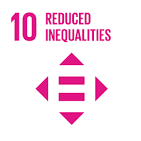The Importance of Reducing Inequalities for a Sustainable Future
In today’s world, the issue of inequality remains a significant challenge that affects societies on a global scale. Social, economic, and political disparities create barriers that hinder progress and development for individuals and communities. Addressing and reducing these inequalities is not only a matter of social justice but also a crucial step towards building a more sustainable and inclusive future for all.
Social Impact
Reducing inequalities is essential for fostering social cohesion and harmony within communities. When individuals have equal access to opportunities such as education, healthcare, and employment, it leads to greater social mobility and empowerment. This, in turn, creates a more inclusive society where everyone has the chance to thrive and contribute positively to their community.
Economic Benefits
From an economic perspective, reducing inequalities can have profound benefits for overall prosperity. By ensuring fair wages, promoting entrepreneurship among marginalized groups, and providing equal access to financial resources, economies can become more robust and sustainable. A more equitable distribution of wealth can lead to increased consumer spending, investment in local businesses, and ultimately drive economic growth.
Environmental Considerations
Inequalities also have implications for environmental sustainability. Vulnerable populations often bear the brunt of environmental degradation and climate change impacts. By addressing inequalities in access to clean water, sanitation, and sustainable energy sources, we can create more resilient communities that are better equipped to face environmental challenges. Promoting environmental justice alongside efforts to reduce inequalities is crucial for ensuring a healthy planet for future generations.
Global Cooperation
Reducing inequalities is a complex task that requires collaboration at local, national, and international levels. Governments, civil society organizations, businesses, and individuals all have a role to play in creating a more equitable world. Through policy reforms, advocacy efforts, philanthropy, and grassroots initiatives, we can work together to dismantle systemic barriers and create opportunities for all members of society.
In conclusion, the goal of reducing inequalities is not only about creating a fairer society but also about building a more sustainable future for all. By addressing disparities in income, education, healthcare access, gender equality,
and other areas of social concern,
we can pave the way towards a world where every individual has the opportunity to reach their full potential.
Let us strive towards a future where reduced inequalities are not just an aspiration but a reality that benefits us all.
5 Ways to Actively Reduce Inequalities and Promote Social Justice
- Support organizations that promote equality and advocate for marginalized groups.
- Educate yourself on issues related to inequality and social justice.
- Listen to and amplify the voices of underrepresented communities.
- Advocate for policies that address economic and social disparities.
- Promote diversity and inclusivity in all aspects of life.
Support organizations that promote equality and advocate for marginalized groups.
Supporting organizations that promote equality and advocate for marginalized groups is a powerful way to contribute to the reduction of inequalities in society. By backing these initiatives, you are helping to amplify the voices of those who are often unheard and marginalized. These organizations work tirelessly to address systemic injustices, provide support to vulnerable communities, and push for policy changes that promote fairness and inclusivity. Your support can make a meaningful difference in creating a more equitable world where everyone has the opportunity to thrive and be treated with dignity and respect.
Educate yourself on issues related to inequality and social justice.
To contribute to the goal of reducing inequalities, it is essential to educate oneself on issues related to inequality and social justice. By gaining a deeper understanding of the root causes and impacts of disparities in society, individuals can become informed advocates for change. Educating oneself empowers individuals to engage in meaningful conversations, challenge systemic injustices, and support initiatives that promote equality for all members of society. Through continuous learning and awareness-building efforts, we can collectively work towards a more inclusive and equitable world.
Listen to and amplify the voices of underrepresented communities.
To effectively address reduced inequalities, it is crucial to listen to and amplify the voices of underrepresented communities. By actively seeking out and valuing the perspectives and experiences of marginalized groups, we can gain a deeper understanding of the challenges they face and work towards creating more inclusive and equitable solutions. Empowering these voices not only promotes diversity and social cohesion but also helps in building a society where everyone has an equal opportunity to thrive and contribute positively to the community.
Advocate for policies that address economic and social disparities.
Advocating for policies that address economic and social disparities is a crucial step in promoting reduced inequalities. By pushing for measures that ensure fair wages, equal access to education and healthcare, and opportunities for marginalized communities, we can create a more just and inclusive society. These policies can help level the playing field, empower individuals from all backgrounds, and contribute to a more sustainable future where everyone has the chance to thrive.
Promote diversity and inclusivity in all aspects of life.
Promoting diversity and inclusivity in all aspects of life is a crucial step towards reducing inequalities. Embracing and celebrating differences in race, ethnicity, gender, sexual orientation, abilities, and backgrounds creates a more equitable and harmonious society where everyone feels valued and respected. By fostering environments that welcome diverse perspectives and experiences, we can break down barriers to opportunity and create a more inclusive world where all individuals have the chance to thrive and contribute meaningfully.

